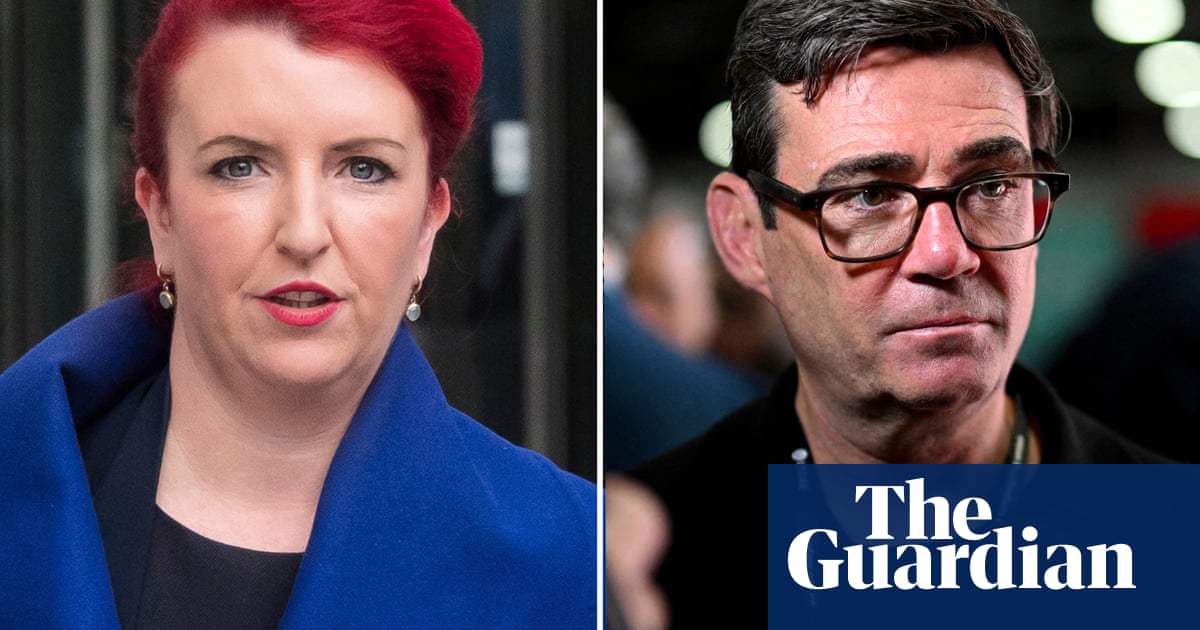Next month’s spending review must be an “economic reset” based on a bold wealth tax and higher public investment, the former cabinet ministerLouise Haighis to argue, as Keir Starmer faces renewed pressure from within Labour to change course.
Haigh’s comments come asAndy Burnhamcalled for Labour to “re-establish itself unequivocally once again as the party of working-class ambition” with ambitious offerings on housing and education.
Burnham, the mayor of Greater Manchester, will say ministers should allow mayors to build on public land, and set a target for the point at which more new social homes are being built than existing ones are sold off.
Haigh and Burnham will make their interventions in speeches at an event taking place on Saturdayorganised by the Labour-allied thinktank Compass.
Haigh, whoquit the cabinetin November after it emerged she had been convicted of fraud over a missing work phone, will reiterate her call for a wealth tax after the local election results from 1 May, which she called “a warning” from voters that they wanted bolder policies.
She will say: “The spending review must be a moment for an economic reset. I welcome the prime minister’s review of winter fuel changes but we must go further, ripping up our self-imposed tax rules and taxing the country’s vast wealth.”
Haigh will say the current tax system “punishes earned income but barely touches the sides of the real driver of inequality – wealth”. It is time to “finally move beyond a broken model where working people’s wages are topped up by tax credits and benefits, leaving bad employers and landlords to profit”, she will say.
“It’s about moving from a system of handouts for the rich to real investment for everyone else. We need real reform: a proper wealth tax that rewards work, closes loopholes and finally gives us the means to invest in the NHS, schools and our communities.”
According to extracts of his speech released in advance, Burnham will say the spending review “will define the rest of this parliament”, and he will call forLabourto focus on ways it can positively combat the electoral threat from Reform UK.
Burnham will say: “Rather than standing for the status quo, the time has come for the party to re-establish itself unequivocally once again as the party of working-class ambition, shedding the perception in the Midlands and the north of a London-centric, university-oriented party.”
This would require a particular focus on housing and education, to particularly address “the single biggest cause of Britain’s modern malaise: a housing crisis caused not by immigration but by ideology”.
The Thatcher-era right-to-buy policy, without investment in new social homes, “shattered the foundations on which generations of working-class British families built better lives”, Burnham will say.
“Labour’s clarion call should be to free Britain from the grip of the housing crisis. In this spending review, working with mayors in the big city regions, it should set the date by which each will reach the crucial tipping point of building more social homes than they are losing.
“This is the moment when, instead of tightening its grip, the housing crisis starts to ease. To do that, the spending review should unlock public land for mayors to use to build a new generation of council homes at pace – akin to the drive of the postwar Labour government.”
Angela Rayner, the deputy prime minister and housing secretary, has alreadyannounced plansto restrict right to buy and has pushed for more investment in social homes, but as yet this has done little to ease the housing crisis.
Other speakers at the Compass-run event will include Mark Drakeford, the former first minister of Wales, the Labour MPs Rachael Maskell and Simon Opher, and the junior energy minister, Miatta Fahnbulleh.
